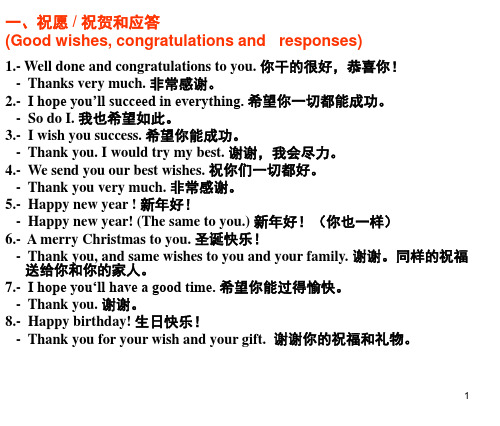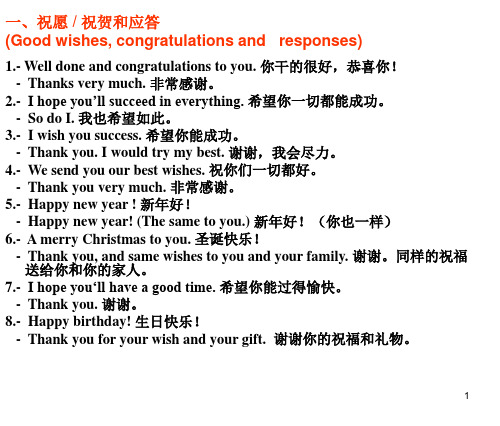英语日常交际用语(课堂PPT)
英语口语 greeting PPT

英语问候语中,正式的通常有:
1.How do you do?(初次见面通常用语) 2.How are you?(比较熟悉的人之间用语) 3.How are you getting along with...?(你近来... 可好?) 4.How are you doing?(您工作还顺利吧?) 5.How is everything?(一切还好吧?) 6.How is your vacation/holiday(s)/weekend?( 假期怎么样?)
大家有疑问的,可以询问和交流
可以互相讨论下,但要小声点
1.How do you do? 2.How are you? 3.How are you getting
along with...? 4.How are you doing? 5.How is everything? 6.How is your vacation? 7.What's up? 8.Hello?Hi? 9.What's going on? 10.How is life? 11.How is it going?
No. 2 Hexi Street, Tianjin
Design your future name card.
First imagine the following things in 2020.
(1) Your address: ______________________________ (2) Your phone number: _________________________ (3) Your job: __________________________________ (4) Your position (职位): _________________________ (5) Your e-mail address: ________________________
初中英语日常交际用语PPT课件

15.时间、日期和回答 Time, dates and responses
1) What’s the time? / What time is it? It’s 5 o’clock / half past six (six thirty) / a quarter to /past ….
3) Hold on, please. / One moment, please. 4) He / She isn’t here at the moment.
He / She is not here right now. 5) Can I take a message for you? 6) I called to tell you that.
VIII.惊讶惊奇 (Surprise) Really? Oh, dear! Is that so?
IX. 喜好与厌恶 (Likes and dislikes) I like / love (to do)… (very much). I hate / don’t like (to do)….
16.其它方面
I. 意愿 (intentions) I’m going to do…. / I will do …. I’d like to do…. / I want / hope to do….
II. 遗憾和同情 (regrets and sympathy) It’s / What a pity! (I’m) sorry to hear it / that.
a. What’s the weather like today? How’s the weather in…?
英语口语培训讲座PPT

Dialogue 4 A: Have a nice weekend! B: Thanks. You too!. A: Do you have any plans? B: Another day, another dollar. (和往常一样)
汇报日期
01
02
03
你认识……?
Do you know……
2
It’s been lovely to see you again.
3
Look forward to seeing you again.
4
祝你万事如意
All the best.
Best wishes.
Regards to your parents.
4
Send your parents my best.
Are you leaving for Guangzhou soon?
I guess so. Perhaps next Monday.
Dialogue 2 How are you getting along? I haven’t seen much of you lately. Keeping busy. Doing what? I am supposes to give you my oral defense(答辩) tomorrow. A: Well, keeping busy before oral defense is all in day’s work. be all in day’s work:不足为奇,司空见惯
汇报日期
感谢您的观看
Dialogue 2 A: I must run along now. I’ve enjoyed this evening very much. B: It was a pleasure having you. A: Every success with your research project. I hope it goes well. B: Thank. Take care then.
英语日常交际用语(课堂PPT)

一、祝愿 / 祝贺和应答 (Good wishes, congratulations and responses)
1.- Well done and congratulations to you. 你干的很好,恭喜你! - Thanks very much. 非常感谢。
5.- Happy new year ! 新年好! - Happy new year! (The same to you.) 新年好!(你也一样)
6.- A merry Christmas to you. 圣诞快乐! - Thank you, and same wishes to you and your family. 谢谢。同样的祝福 送给你和你的家人。
- Yes, I would like. 好的,我很愿意。 6.- You and your friends could come over to my house and taste some moon-cakes.
你和你朋友可以来我家,尝尝月饼。 - OK. Thank you very much. 好的,非常感谢。 7. - Be my guest. 请随便 - Much obliged. 非常感谢
4
五、劝告和建议 (Advice and suggestions)
1.- The park isn‘t far from here. Shall we walk there? 公园离这儿不远,我们 走着去吧?
- OK. No problem. 好的,没有问题。 2.- You‘d better close the windows. It’s cold in the room. 你最好把窗子关上吧,
英语情景交际课件(公开课)ppt (1)

B. Not really D. That's cool
解析 考查交际用语。not really 说明自己没打过棒
球,与后面的“我认为学打棒球很有趣”相吻合。
例 3 — Do you think their table tennis
team will win the first place at the coming Asian Games? —___.Ours is much stronger than theirs. D
3 .能同时回答 Thank you. 和 Sorry. 的 答语如下: Think nothing of it. / That's OK. /That's all right. / Forget it.
10.----Shall we go camping this weekend? -----______________________ It / That (all) depends . (那要看情况而定) 11.----I am afraid I can’t pass the coming test. Cheer up 高兴起来,振作 ----___________( 起来). I am sure you can make it.
4. Go ahead.表示鼓励对方做某事,
意为“请吧;请说吧;请开始吧;请尽 管用”。注意:在回答May I use…或I wonder if I can use…时,如借用的东西 可以拿走,就用 Here you are. 或者用 Go ahead. Help yourself.可表示“请随 便吃、喝”外,还可表示“请自己动手 做/拿……”。
必备的几组易混淆的交际用语
1. All right 好的,行的。 That's all right. 没关系,
英语口语交际表达用语PPT课件

(ages) ! How’s everything going?
• 2)Oh, hello, Wang. I’m so glad to see you. How’re
you doing?
• 3)Hi, John! Nice to meet you here. How are you
getting on? (How are things with you?)
Friendship Delegation? • 3)Mr. Johnson, allow me to introduce you to Mr. Wang.
Jack, I'd like you to meet my Chinese friend, Wang.
6
• (3)Exchange of formalities
• 2)How’s Bob?
•
How’s the family?
•
How’s everybody at the office?
2
• (2)Expressing surprise and pleasure in seeing
someone
• 1)Hello, Jack. Haven’t seen you for a long time
•
—Good-bye.
• 2)I’m afraid I’ve got to be going now. So long!
•
—So long!
• 4 )I’m afraid I must be going now. It was nice meeting you. See you later.
•
—(I’m) glad to have met you, too. Take care.
六年级英语日常用语交流技巧课件

六年级英语日常用语交流技巧课件一、自我介绍的常用句型:1. Hello, everyone! My name is [名字].(大家好!我叫[名字]。
)2. Nice to meet you! (很高兴见到你们!)3. I am [年龄] years old. (我[年龄]岁。
)4. I am from [国家/地区].(我来自[国家/地区]。
)5. I am in [班级/年级].(我在[班级/年级]。
)6. My hobbies are [爱好].(我的爱好是[爱好]。
)二、日常交往用语:1. Greeting(问候):- Good morning/afternoon!(早上/下午好!)- How are you today?(你今天怎么样?)- What's up?(有什么新鲜事吗?)- How's it going?(近况如何?)2. Introducing(介绍):- This is my friend, [名字].(这是我的朋友[名字]。
)- Nice to meet you!(很高兴见到你!)- Have you met [某人] before?(你之前见过[某人]吗?)- Let me introduce myself. I am [名字].(让我介绍一下自己。
我叫[名字]。
)3. Asking for help(求助):- Can you help me?(你能帮我吗?)- I have a problem. Can you give me some advice?(我遇到问题了,你能给我一些建议吗?)- Could you please explain this to me?(你能给我解释一下吗?)- I don't understand. Can you repeat that, please?(我不明白,你可以再重复一遍吗?)4. Expressing preferences(表达喜好):- I like [事物].(我喜欢[事物]。
英语日常交际用语(精选课件)

英语日常交际用语英语日常交际用语ﻫ1.问候Greetingsﻫ(1)Good morning(afternoon,evening)早上好(或:下午、晚上)好Hello.你好(或:喂)Hi.你好(或:嗨)—-How are you?你好吗ﻫ——Fine,thank you,and you?(very well,thank you.)好,谢谢,你也好吧?或:很好,谢谢你(2)Best wishes(regards)tosb。
问候汤姆好ﻫPlease give my regards(best wishes,love) toTom.请代我向汤姆致以问候ﻫPlease remember me to Tom。
请代我向汤姆问候Say hello to Tom。
向汤姆问好ﻫ(3)Glad(Ple ased) to meet you here(again).很高兴在这里(或:又)见到你ﻫ2。
介绍Introductions ﻫ(1)This is Mr(Mrs,Miss,Ms) Green.这位是格林先生(或:夫人、小姐、女士)ﻫThis is Comrade Li Ning.这位是李宁同志ﻫMay I introduce you to my friends?我来把您介绍给我的好朋友好吗?I’d like you to meet MrGreen.我想请您见见格林先生ﻫ(2)--How do you do?(初次见面时用)您好ﻫ——How do you do?您好Nice(Glad,Pleased) to meet(see) you.见到您我很高兴ﻫNice meeting you,Mr Green。
(多用于分手时)格林先生,我真高兴能认识您(3)My name is Li Ning.我名叫李宁ﻫI’m a teacher。
我是老师ﻫI'm Chinese.我是中国人Excuse me,what's your (full)name,please?请问你贵姓(您尊姓大名) ﻫ(4)I have often heard about you.我常常听人谈起你ﻫI have often wanted to meet you。
日常交际用语PPT课件

学习对方文化
了解对方的文化背景、价 值观、社会习俗等,有助 于更好地理解和使用交际 用语。
提高语言能力
掌握一门外语并熟悉其文 化背景和语言习惯,可以 提高跨文化交际能力。
掌握基本礼仪,避免文化冲突
称呼礼仪
在跨文化交际中,要正确使用称呼方式,尊重对 方的身份和地位。
见面礼仪
不同文化背景下,见面礼仪也有所不同,要遵循 对方文化的见面礼仪。
学习反思与不足
分析了自己在学习过程中遇到的问题和困难,如对某些用语的运 用不够熟练、缺乏实际交流经验等。
改进措施与目标
针对自身存在的不足,提出了相应的改进措施和学习目标,如加 强口语练习、积极参与实践活动等。
展望未来发展趋势,不断提升自身素养
跨文化交际能力的重要性
强调了在全球化背景下,具备跨文化交际能力的重要性, 包括尊重文化差异、掌握多种语言等。
。
倾听与回应
认真倾听他人的谈话内容并给予 积极回应和反馈如“我明白你的 意思了”、“你说得对”等表达
认同和理解。
04
跨文化背景下交际用语差异及应对策略
中西方文化背景差异对交际用语影响
价值观差异
中西方价值观存在较大差异,如个人主义与集体主义、权利距离 等,这些差异会影响人们的交际方式和用语选择。
思维方式差异
推动事业发展
在职场中,良好的交际习惯有 助于建立良好的工作关系,提 高工作效率和团队协作能力, 从而推动事业发展。
02
常见日常交际用语分类与特点
问候与告别类用语
问候用语
用于见面时的寒暄,如“你好”、“早上好”等。
告别用语
用于分别时的告别,如“再见”、“晚安”等。
问候与告别用语的特点
英语口语训练:常用英语口语PPT课件

learning method
• Using PPT courseware: This course adopts PowerPoint presentations as the main teaching material, providing visual and auditory support for students' learning.
Enhancing language comprehension
The course aims to improve students' ability to understand English-speaking materials and media.
Developing communication skills
used in the afternoon, usually after noon.
03
04
Good evening
used in the evening, usually after sunset.
Hello
a general greeting, can be used at any time of the day.
learning method
• Using PPT courseware: This course adopts PowerPoint presentations as the main teaching material, providing visual and auditory support for students' learning.
高考英语二轮复习课件:专题十五交际用语(共35张PPT)

(5)Just a little please.就请上一点吧。 (6)It's so delicious.Thank you.太可口了,谢谢。 (7)No,thank you.I've had enough. 谢谢,我已经吃饱了。 (8)Can I take your order?我可以让你点菜吗? (9)Bill,please.结账。
表示请求允许和建议的常用语 1.请示别人允许 (1)May/Can/Could I...?我可以...吗? (2)I wonder if I could...我不知道我能否... (3)Would/Do you mind if I...?如果我...,你介意吗?
A.同意别人的请求 ①Yes/Certainly/Of course (you may).可以/当然可以。 ②That's OK./All right.可以。 ③Go ahead,please.行,尽管做吧。
答语: That's all right.别客气,没关系。 It's all right.没关系。 Not at all.不用谢。 You're welcome.别客气。 Don't mention it.不用谢。 It's my/a pleasure.不用谢。 My pleasure.不用谢。 With pleasure.很乐意。
(2)Help yourself to some fish/whatever you like. 请随便吃鱼/你喜欢吃的东西。 (3)Which would you prefer,A or B? 你更喜欢A还是B? (4)How about having seafood for a change? 换换口味吃海鲜怎么样?
服务行业英语口语培训PPT

2024/8/17
19
Unit 3 Booking a Hotel Room 预订酒店房间
Key Words (关键词汇) hotel / hEu´tel / n.旅馆 clerk / kla:k/ n.职员 customer / ´kQstEmE / n.顾客 date / deit / n.日期 last name 姓 reserve / rizE:v / v.预订 separate /´sepErit / a.单独/分开的 shower / ´∫auE / n.淋浴 pension / ‘pen∫En / n.伙食 I nclusive / in´klu:siv / a.包括的 check / t∫ek / n.支票 deposit / di´pCzit / n.定金
这儿离机场多远? T:It′s about an hour′s drive .
开车大约1小时的路程。 P:I need to get there before eight . Can we make it ?
我得在8点前到机场。我们能赶到吗? T:I can′t promise , but I′ll do my best .
3.Which counter should I go for checking in ? 我到哪个柜台办理登机手续?
4.Can I see your ID , please ? 请您出示身份证件。
5.What time will boarding start ? 什么时候可以登机?
2024/8/17
H:Certainly ,Two separate rooms with shower and bath .Full pension. 当然可以,两间独立的房间,带有淋浴和浴缸。伙食全包。
基础日常交际用语ppt课件

(7)告诉某人有电话找他(她):
There is/was a telephone call for you,….
…,有电话找你。
不要说:…,you have/had a telephone call.
(8)打电话的结束语:
Goodbye! Bye. (熟悉的人之间才用这句用语。)
Not at all. 没什么;别客气。 或者说:That's all right/OK. 行了
;没什么。
You're welcome. 不用客气
这一用语多用于服务行业的工作者对顾客、旅客 或警察对路人之间。熟人之间较少用这一用语。
不要受中国文化习俗的影响,当别人致谢后说: Don't thank me.It's my duty to help you. 不用感谢我,帮助你是我的责任……等一类的话。
是的,我是……。 也可以简单地说:Speaking. 不要受汉语的影响说: I'm…. Hello.This is …here. 喂,我是……。
不要问对方:Who are you? 应该说:
Who's that(speaking)?
你是哪位?
(3)告诉对方拨错了电话号码: No, there's no…here.不,这儿没有……
这是用于熟悉的人之间的打呼用语。不要 受中国文化习俗的影响,遇见外国朋友 就说:
Have you had your breakfast/ lunch/supper? 你吃饭了吗?
或者说:Where are you going? 你去哪里?
Hello/Hi. 你好。
要好的朋友或同辈之间,在非正式场合下才可以用这一 用语。例如: Hi ! Morning/Arternoon/Evening! Long time no see! 好久不见了!
日常交际用语说课(课件)通用版英语

汇报人:xxx
目
教学背景
录
教学重难点
教学准备
教学过程
课堂延伸
教学反思
01
教学背景
适用对象
教学目标
• 知识目标 • 学生能够了解和掌握以下日常交际用语 • 问候与打招呼(如:Hello, Good morning等)。 • 介绍(如:This is, My name is等)。 • 道歉与感谢(如 • Sorry, Thank you等) • 能力目标:学生能够运用所学的日常交际用语进行真实的对话。具体包括
03
以给予掌声鼓励。
教师点评与总结
结合学生的小组表演,教师对学生的表现进行 点评和总结。
针对学生在表演中出现的不足之处进行指导和 辅导,并请其他小组的学生进行优秀表演展示 。
强调在日常交际中正确使用英语的重要性,以 及通过本节课的学习学生们能够学到什么。
05
课堂延伸
学生练习安排
可以通过组织学生进行情景剧的排练及表演,来 进一步加深学生对日常交际用语的理解和应用。 学生们可以自由组队,选择自己喜欢的场景进行 排练,并在课堂上进行展示
如何通过教学环节的设计,使学生能够自主运 用学到的交际用语进行真实的对话,提高口语 表达能力。
如何通过小组活动等方式,培养学生的合作精
3
神和口语表达能力,并鼓励他们积极参与到课
堂活动中来。
03
教学准备
教学资源
制作有关日常交际用语的PPT,包括问候、介绍 、道歉、感谢等场景及其用法。
视频/录音素材
小组活动和个人表达环节中,学生都能对其他同 学的表现进行评价,能发现其他同学的优点和不 足,并在之后的个人发言中得以改正和提高。
对于日常交际用语的掌握情况比较理想,大部分 学生都能在相应的场景下正确使用这些用语。
英语日常交际用语(对话16页)ppt课件

你和你朋友可以来我家,尝尝月饼。 - OK. Thank you very much. 好的,非常感谢。 7. - Be my guest. 请随便 - Much obliged. 非常感谢
5.- I think Chinese is more popular than any other subject. 我觉得中文可比其 他科目更受欢迎。
- But on my point of view, art is more popular. 但是依我看,美术更受欢迎。 6.- Don‘t think in Chinese when you’re speaking English. 说英语时不要想着
2.- I think foreign languages are more interesting than science. 我认为外语比 科学更有趣。
- I really can‘t agree with you. I prefer science. 我不同意你的意见,我更喜 欢科学。
3.- I think I shall read a book instead. 我想我应该换成读书。 - Good idea. That‘s much better than watching a bad TV Program. 好主意, 比起看不好的电视栏目好多了。
4.- I don‘t think that it’s true. He‘s always telling strange stories. 我觉得那不 是真的,他总是将那种奇怪的故事。
英语日常交际用语PPT共18页

41、实际上,我们想要的不是针对犯 罪的法 律,而 是针对 疯狂的 法律。 ——马 克身体一 样。— —贝卡 利亚 43、法律和制度必须跟上人类思想进 步。— —杰弗 逊 44、人类受制于法律,法律受制于情 理。— —托·富 勒
45、法律的制定是为了保证每一个人 自由发 挥自己 的才能 ,而不 是为了 束缚他 的才能 。—— 罗伯斯 庇尔
66、节制使快乐增加并使享受加强。 ——德 谟克利 特 67、今天应做的事没有做,明天再早也 是耽误 了。——裴斯 泰洛齐 68、决定一个人的一生,以及整个命运 的,只 是一瞬 之间。 ——歌 德 69、懒人无法享受休息之乐。——拉布 克 70、浪费时间是一桩大罪过。——卢梭
- 1、下载文档前请自行甄别文档内容的完整性,平台不提供额外的编辑、内容补充、找答案等附加服务。
- 2、"仅部分预览"的文档,不可在线预览部分如存在完整性等问题,可反馈申请退款(可完整预览的文档不适用该条件!)。
- 3、如文档侵犯您的权益,请联系客服反馈,我们会尽快为您处理(人工客服工作时间:9:00-18:30)。
4.- We send you our best wቤተ መጻሕፍቲ ባይዱshes. 祝你们一切都好。 - Thank you very much. 非常感谢。
5.- Happy new year ! 新年好! - Happy new year! (The same to you.) 新年好!(你也一样)
2.- I hope you can come to the dance next Saturday. 希望你下周六能来跳舞。 - I’m sorry, I had already other plan for that day. 不好意思,那天我已经有了 安排。
3.- Will you go dancing with us? 你跟我们一起去跳舞好吗? - Of course. I’ll be glad to. 当然了,我很高兴能去。
6.- A merry Christmas to you. 圣诞快乐! - Thank you, and same wishes to you and your family. 谢谢。同样的祝福 送给你和你的家人。
7.- I hope you‘ll have a good time. 希望你能过得愉快。 - Thank you. 谢谢。
句话:不管做什么事,都要做好它。 - Thank you for your advice. 谢谢你的建议。 7. - Don’t waste your time. It wouldn’t be within your power 不要浪费时间
了,你也没这个能力。 - Right as rain. 千真万确(你说的很对)
2.- I think foreign languages are more interesting than science. 我认为外语比 科学更有趣。
- I really can‘t agree with you. I prefer science. 我不同意你的意见,我更喜 欢科学。
3.- I think I shall read a book instead. 我想我应该换成读书。 - Good idea. That‘s much better than watching a bad TV Program. 好主意, 比起看不好的电视栏目好多了。
8.- Happy birthday! 生日快乐! - Thank you for your wish and your gift. 谢谢你的祝福和礼物。
1
二、邀请和应答 (Invitations and responses)
1.- Would you like to come to the party? 你会来参加聚会吗? - Oh, thank you, I will. Where will you have the party? 哦,谢谢,我会来的。 你们在哪里举行呢? - In the UBC. And the party starts at 7:00pm. 在UBC上岛咖啡,聚会从晚上 7:00开始。 - OK. I will be there on time.好的,我会按时到。
2
三、同意和不同意(Agreement and disagreement)
1.- I think the shop is closed at this time. 我觉得这会儿商店已经关门了。 - No, it‘s still open. The normal close time is 21:00pm. 不, 还开着。正常关 门时间是晚上9点。
一、祝愿 / 祝贺和应答 (Good wishes, congratulations and responses)
1.- Well done and congratulations to you. 你干的很好,恭喜你! - Thanks very much. 非常感谢。
2.- I hope you’ll succeed in everything. 希望你一切都能成功。 - So do I. 我也希望如此。
顾好自己,别让自己太忙了。 - Yes, I will. Thanks. 好的,我会的。谢谢你。 5.- The museum is very far from here. Let‘ catch a bus, shall we? 博物馆离这
里太远了,我们坐汽车去,好吗? - OK. Let’s catch a bus. 好的,我们坐汽车吧。 6.- You must remember the saying: Whatever you do, do it well. 你要记住一
5.- Excuse me. May I use your dictionary?打扰一下,我能用一下你的词 典吗?
2.- Oh, I am so sorry to interrupt your study. 哦,很抱歉打扰你的学习。 - That‘s quite all right. What could I do for you? 没问题,有什么事吗?
3.- I‘m sorry to give you so much trouble. 不好意思给你添这么多麻烦。 - No trouble at all. 不麻烦。
4.- I‘m sorry. I lost the key to your bike. 对不起,我把你的车钥匙丢了。 - It doesn‘t matter. I still have one copy at home. 没关系,我家里还有一 套。
5.- Sorry to have kept you waiting for a long time. 不好意思让你等这么长 时间。
- Yes, I would like. 好的,我很愿意。 6.- You and your friends could come over to my house and taste some moon-cakes.
你和你朋友可以来我家,尝尝月饼。 - OK. Thank you very much. 好的,非常感谢。 7. - Be my guest. 请随便 - Much obliged. 非常感谢
汉语。 - Yeah, I agree with you.// I couldn’t agree more.
是的,我同意你的意见。
3
四、道歉和应答 (Apologies and responses)
1. - Sorry to trouble you. 抱歉打扰你。 - That‘s all right. 没关系。
4.- I don‘t think that it’s true. He‘s always telling strange stories. 我觉得那不 是真的,他总是将那种奇怪的故事。
- I know. But this time I can‘t decide if he is right or not. 我知道,但是这次 我也无法判断他是对还是不对。
5.- I think Chinese is more popular than any other subject. 我觉得中文可比其 他科目更受欢迎。
- But on my point of view, art is more popular. 但是依我看,美术更受欢迎。 6.- Don‘t think in Chinese when you’re speaking English. 说英语时不要想着
3.- May I call you James directly ? 我能直接叫你James吗? - Of course, if you wish. 当然可以,如果你愿意。
4.- Could I borrow your bicycle, please?我能借用一下你的自行车吗? - Of course. With pleasure. 当然可以。我很愿意。
6
七、请求允许和应答 (Asking for permission and responses)
1.- Please let me help you. 我来帮你吧。 - No, thanks. I can handle it. 不用谢谢。我自己能行。
2.- Can I see your license, please?我能看一下你的证件吗? - OK. Wait one moment. Here you are. 好的,等一会儿。给你。
5
六、打电话 (Making telephone calls)
1. - Hello! No. 5 Middle School. 你好,这里是第五中学。 - Hello, may I speak to Mr. Green, please? 你好,我想找Green先生。 - I’m sorry. Mr. Green is not in right now. 对不起,Green先生这会儿不 在。 - When will he be back? 那他什么时候回来? - About six this afternoon. 大概下午六点吧。 - All right. I’ll ring/call again then. 好吧,我到时候再打电话给他。 - Very well. Bye-bye!好的,再见!
- It doesn‘t matter. 没关系。 6.- You haven‘t paid for it yet, sir! 先生,你还没付钱呢。
- Oh, I‘m really very sorry. I am so hurry to catch the bus. 哦,对不起。我光顾着要去赶汽车了。
2. - Hello! 你好! - Hello, Han Mei. Could I borrow your charger please? 你好,韩梅。我 能借一下你的充电器吗? - Sorry! It‘s not a very good line. Could you speak more loudly? 对不起, 线路不太好。你能大点声吗? - Could I borrow your charger for the Nokia mobile? 我能借用你的诺基 亚手机充电器吗? - Sure. I‘ll bring it to you tomorrow. 当然可以。明天我给你带来。 - Thank you. Goodbye. 谢谢你,再见。
